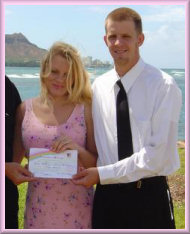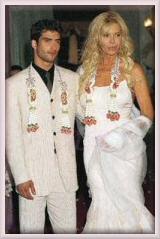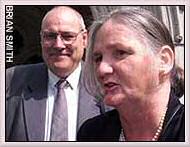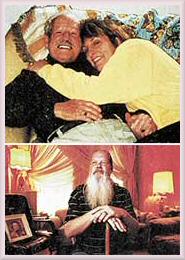
Marriage and the
Transsexual Woman
Chapters Includes in This Section include:
Finding Love as a Transsexual Woman
Transssexual Women and Sex
Essential Considerations for Transsexual Love
Transsexual Erections Sexual Joy
Cleaning Up Your Act Before Starting on a Love Journey
Early Stage Gender Transition and Love
The Sexual Orientation of Transsexual Women
Sorting Out Your Sexual Orientation as a TS Woman
Transsexual Pregnancy
Marriage and the Transsexual Woman
The Transsexual Mother
Dating and Loving a Man - for Transsexual Women
The Secret to Finding the Perfect Man for Marriage - for TS Women
Lesbian Females with Transsexuals
Trans Lesbians: Love Between Two Transsexual Women
Transsexual Women that Love and Date Straight Females
Post Operative Transsexual Love


| Jacelyn was able to legalise her status as a woman in 2004; pictured with husband Adam and their certificate of marriage |
|
Note: This article was originally written before the Gender Recognition Act received Royal assent on July 1, 2004. The new legislation makes it possible in the United Kingdom for transsexuals to change the sex/gender designation on their birth certificates, a designation that is required in order for transsexual marriages to be legally recognized as “heterosexual.”
|
The Gender Recognition Act has affected thousands of male-to-female transsexuals in the United Kingdom. In addition to legalizing marriage to a man, the law has many other effects such as ensuring that they can claim women's pension rights and that they are not sent to a male prison in the event of being convicted of a crime.
It is reasonable to suggest that most women, including many transsexual women, hope to eventually find a loving husband and enjoy a long, happy and secure marriage.
|
Statistics are limited, but it's generally thought that about 20-30% of transsexual women will marry a man at least once, e.g. one American study of 51 post-SRS women aged 20 to 58 found that 12 were married as women (21%) while another 23 were in relationships with men. Other studies show similar results:
|
Study
|
|
Sample Size
|
Married
|
Percentage Married (%)
|
Ball, 1981
|
|
23
|
|
5
|
|
22
|
|
Dudle, 1989
|
|
18
|
|
4 (2 had already divorced and were married again)
|
|
28
|
|
Wålinder & Thuwe, 1975
|
|
11
|
|
7 (2 had already divorced)
|
|
64
|
|
Turner, Edlich & Edgerton, 1978
|
|
47
|
|
18 had married within one year of SRS and 6 had adopted children.
|
|
38
|
|
Clearly these figures show that far fewer transsexual women marry men than genetic women (93% over their life time in Western Europe), but the studies can give no more than a rough indication of the actual situation. They are distorted by several factors:
|
|

A chart showing the age of legal change of status (usually after SRS) of 712 German transsexuals aged 18 to 79. The mean age is 34.
Source:
Weitze C., M.D., Osburg S., M.D. (1997)]
|
| Follow-up studies are usually carried with in a few years of SRS and many transwomen may not marry this rapidly. |
|
| The average western transsexual woman only has SRS at a median age of 30 years (a mean age of 32, raised by over 50's), which reduces the opportunities for transwoman wishing to marry as a woman. [Note that Asian transsexual women tend to be far younger at SRS, with a mean age well under 30.] |
|
| Transsexual women face many more obstacles to obtaining a "legal" marriage. |
|
| About a quarter of transsexual women (with a bias towards older age groups) consider themselves lesbian, and are thus unlikely to seek marriage with a member of the opposite sex. |
|

Genetically XX women tend to have an index finger longer than their ring finger, XY transwomen a ring finger longer than their index finger (as above).
|
There is now absolutely no doubt that most transsexual women can satisfactorily and fully enter in to marriage (in all physical as well as social senses) with a man on exactly the same terms as any infertile but genetically "XX" woman. Indeed, with the help of modern medicine, many post-operative transsexual women pass so well both physically and socially that it is often their own choice as to whether to reveal their male background to a boyfriend or husband. As many men react badly to being told of their girlfriends or wife's transsexuality, young transwomen in particular often prefer to hide this and risk eventual discovery, claiming instead some other medical problem which prevents them from ever menstruating or having children. For example in the study referred to earlier one woman (now in her mid-30's) met her future husband soon after her SRS while working as a receptionist, they've now been happily married for seven years and her husband still doesn't know of her surgery - which the authors say is not unusual.
Dr Stanley Biber
has said of his 3,500 MTF women, "A lot of them get married and have families and don't want to remember their lives before."
|
|

|
April Corbett
& husband Arthur Corbett
|

Belinda Darlington
However, while many MTF transsexuals seek marriage and a normal life as a woman, the law conspires against them in many countries. In 1970 Lord Justice Ormrod issued his infamous judgment on the
Corbett v. Corbett (otherwise Ashley)
case, a ruling which has ever since prevented Male-to-Female transsexual women from marrying, both in the United Kingdom and by setting a common law precedent in many other countries as well, including the United States.
|
Arthur Corbett applied for nullity of his marriage to April Corbett (neé Ashley) on the grounds of non-consummation and his spouse's transsexualism. At the time there was actually widespread agreement with Lord Ormrod's judgment that:
|
Sex is clearly an essential determinant of the relationship called marriage, because it is and always has been recognized as the union of man and woman. It is the institution on which the family is built, and in which the capacity for natural heterosexual intercourse is an essential element. It has, of course, many other characteristics, of which companionship and mutual support is an important one, but the characteristics which distinguish it from all other relationships can only be met by two persons of opposite sex.
|
It was his subsequent definition of "sex" for the purpose of marriage that was to become the source of many problems,
|
Since marriage is essentially a relationship between man and woman, the validity of the marriage in this case depends, in my judgment, on whether the respondent is or is not a woman. The question then becomes what is meant by the word 'woman' in the context of a marriage, for I am not concerned to determine the 'legal sex' of the respondent at large. Having regard to the essentially heterosexual character of the relationship which is called marriage, the criteria must, in my judgment, be biological, for even the most extreme degree of transsexualism in a male or the most severe hormonal imbalance which can exist in a person with male chromosomes, male gonads and male genitalia cannot reproduce a person who is naturally capable of performing the essential role of a woman in marriage.
|
In other words, the law should adopt, in the first place, the first three of the doctors' criteria, ie the chromosomal, gonadal and genital tests, and, if all three are congruent, determine the sex for the purpose of marriage accordingly, and ignore any operative intervention. .... My conclusion, therefore, is that the respondent is not a woman for the purposes of marriage but is a biological male and has been so since birth. It follows that the so-called marriage of 10 September 1963 is void.
|
Lord Ormrod basically stated that if a transsexual woman was originally born physically male with XY genes then she will always be legally "Male", and in practice not just for marriage purposes, regardless of her current external female genitalia; psychology; hormones; and secondary sexual characteristics. The ruling made the ultimate proof of one's sex the original Birth Certificate, and it became impossible to get this later corrected or altered. A transsexual woman with a birth certificate identifying her as "Boy" or "Male" can never lawfully to marry a man (other than presumably a Female-to-Male transsexual!) as this would be an indecent and void "same-sex" marriage. The judge held the Corbett's marriage to be a same-sex marriage and thus Mrs Corbett found that her marriage was by decree nisi pronounced to have been by law always void by reason of the parties not being respectively male and female, and that legally she had always been Miss Ashley all along. [Thankfully the prevailing practise in the UK is to allow the use of the prefix "Mr", "Mrs", "Ms" or "Miss" as appropriate, and this is possible in even on official documents with a minimum of formality.]
|
Lord Ormrod's judgement made a very narrow definition of "male" and "female" largely based on chromosomal, gonadal and genital sex at birth. To be fair, Ormrod himself recognized potential problems with respect people born "intersex", and in recent years this has allowed sympathetic judges to be far more lenient and flexible as regards the legal sex of these - but the rigidity has continued for transsexuals. The deficiencies resulting from widespread use (again to be fair, probably far more than Ormrod intended or expected) of the Corbett judgment to determine legal sex have now been repeatedly and glaringly proven, but despite subsequent testing and re-testing of the law in UK, Europe and America, most countries still reject the validity of marriages entered into after a transsexual person has transitioned. For example one judge concluded: "there is no authority in Ohio for the issuance of a marriage license to consummate a marriage between a post-operative male to female transsexual person and a male person".
|

Transsexual woman Katherine bravely married her beau in 1972.
|
The judgment of Lord Justice Ormrod makes irrelevant the fact that with the benefit of hormonal treatment, modern sex reassignment surgical techniques and other treatments, the majority of post-operative MTF transsexual women can enjoy a normal life as a woman and pass even quite intimate medical examinations as a female. We are now in the ludicrous situation where some women can legally marry, indeed only marry, another woman - a fact which some lesbian transwomen have taken advantage of! The idiocy of the current situation is perhaps further highlighted by the fact that physiologically a post-SRS transsexual woman is very similar to an also genetically male "XY" intersex woman suffering from Complete Androgen Insensitivity Syndrome who's had her testes removed. But the later is usually legally a woman and can freely marry a man because being born with normal female external genitalia she was likely to be identified as a girl at birth, and thus be issued a birth certificate as such. If an AIS woman tried to marry another woman it would be an illegal same-sex marriage, unless it was to a transsexual woman!
|

Harisu and Micky Chung, May 2007
|
The current law is clearly and patently unjust to transsexual women and in desperate need of change. Transsexual women who have lived as a post-op woman for perhaps 10, 20 or 30 years, and have been married 5, 10 or 20 years, can suddenly find upon the death of their husband that:- the marriage was never valid; that they have no legal rights as a widow; that they are denied their inheritance; they have no widows pension; and that they have no right of guardianship over their adopted or step-children.
|
Incidentally, it should be noted that those transsexual women who have by some means obtained a Birth Certificate identifying their sex to be "Female", or have otherwise been able to satisfy the registrar as to their sex, normally marry without incident. Judges will only step in to deny the transsexual woman her female identity and her right to marry a man if the marriage is legally challenged after-the-fact. Of course this possibility, however remote, will always remain a constant nagging worry to such a woman.
|

English & Welsh Marriage Law
If you wish to marry in England and Wales you may do so either by civil or religious ceremony. A civil ceremony can take place at a Register Office or other premises approved by the local authority for marriages (e.g. hotel, stately home, etc.). A religious ceremony can take place at a Church or Chapel of the Church of England or Church of Wales, or any other place of worship that has been formally registered by the Registrar General for marriages.
English law currently does
not
permit Proxy Marriages, Cousin Marriages, Common Law Marriages or Same Sex Marriages (a MTF transwoman marrying a man has been legally classified as same sex since Ormod's ruling).
|

Anna Taylor married Paolo using her passport to confirm her identity, not realising her marriage was unlawful because her birth certificate stated that was born male.
|
A few important notes:
1. It is a legal requirement in the United Kingdom that one partner must have been born a male and the other a female (the Birth Certificate generally being accepted as definitive proof). A same sex marriage is automatically void and annulled.
2. For a civil wedding a Notice of Marriage must be given in person to the Superintendent Registrar at least 3 weeks in advance of the wedding, this is necessary to allow the Statuary Form to be publicly displayed so that anyone who has any objection to the marriage can register their objection. No one can give notice on the couples behalf - they have to sign.
3. For a religious wedding, notice must be given to the Approved Person (i.e. a Vicar or Priest) by the betrothed couple sufficiently in advance for the Banns to be displayed for 3 Sundays. Unless he knows the couple very well, the Vicar/Priest will want to interview the happy couple together before consenting to undertake their marriage ceremony, and he may set some conditions.
4. Mandatory identification requirements for marriage are proof of name, age, marital status and nationality. A current passport is an ideal document, however it is always preferred that everyone also shows their full Birth Certificate and this
|
will
be requested. If under 18, a Birth Certificate is required.
5. Any partner that has been married before will need to show formal and original documentary proof that they are free to marry again, e.g. a court stamped copy of a decree absolute, or a certified copy of their late partner's death certificate.
6. (Religious Wedding only) Baptismal Certificate and any other documents requested.
7. The marriage cannot go ahead unless the legal formalities have been completed.
8. A Marriage Certificate is issued after the wedding.
|
Marriage Consummation
The consummation of a marriage is the first time that the husband and wife engage in sexual intercourse after the ceremony of marriage has been performed, thus completing the marriage. The custom dates back to at least the seventh century AD in Christian marriages, and probably as far back to the Ancient Greek period, in the decretal "Ex publico," the twelfth-century Pope Alexander III stated that without consummation, the "final confirmation must needs be wanting" to Our Lord's words on indissolubility. Only by consummation do husband and wife become one flesh; without that their marriage can be dissolved - although increasingly only by the Church.
|

Jessie and Joshua Chung.
|
English Civil Law, and the many countries which derive their own legal systems from this common root, still recognizes consummation as being essential for the completion of a marriage. However in practice it is increasingly difficult to void a marriage that is otherwise totally legally valid, solely on the grounds of non-consummation - divorce (with all its associated costs) is almost always the required now. In many countries we are reaching the point where the consummation of a marriage is not relevant to the Law of the Land. However consummation remains very important to the Christian Church (assuming at least one of the partners is Christian), and often very important to the happy couple.
|
Consummation is performed as an act of reproduction to sanctify the marriage, and many learned Doctors of the Church argued for centuries over what was sufficient to constitute consummation, e.g. whether penetration of the wife's vagina by husband's penis was required, or just the presence of sperm on the vulva. Perhaps because of the great age of the accepted definition of consummation, a medically incurable inability to conceive or bear children is not a problem, there merely has to be a convincing outward appearance of making and being able to have children - in particular the wife must be able to accept penetration of her vagina by a penis, and the husband must be capable of such penetration and ejaculation. In the Medieval Ages there were often observers watching to make sure that a new marriage was properly consummated! By the church's definition, most post-SRS transsexual woman are clearly able to consummate their marriage with a man. (Note: but also by this definition a female-to-male transsexual man cannot change his sex enough to consummate a marriage after SRS, unlike a male-to-female woman. This purely biologically based definition can thus be considered discriminatory, and the associated approach in the legal characterization of "spouse" contrary to sexual equality laws!)
|

Bibiana Fernández
& husband
|
The absence of sexual intercourse and thus marriage consummation has since at least the thirteenth century been grounds for annulling a marriage under under Christian and particularly Roman Catholic canon law - and this was made use of by King Henry VIII! Non-consummation is also still grounds for marriage annulment under civil law in some countries (e.g. the UK) after a sufficient period has passed, but not in other countries (e.g. most US states) if the ability to consummate is there.
A woman's inability to consummate a marriage with a man due to a mental or physical incapacity of some kind, (e.g. still being a pre-SRS woman), is usually legal grounds to void a marriage, but her having an inability to physically conceive or carry children is
not
. Infertility is totally separate from a physical inability to consummate a marriage due to an incapacity in one or both spouses to engage in normal sexual intercourse with each other. This was clearly stated in the ruling of an old English Case (D. v. A) of 1845:
The only question is whether the [spouse] is or is not capable of sexual intercourse or, if at present incapable, whether that incapacity can be removed... . if there be a reasonable probability that the lady can be made capable of a vera copula—of the natural sort of coitus, though without power of conception—I cannot pronounce this marriage void. If, on the contrary, she is not and cannot be made capable of more than incipient, imperfect, and unnatural coitus, I would pronounce the marriage void.
As noted above, even Ormrod in his Corbett vs Corbett ruling stated that the capacity for normal heterosexual intercourse is an essential determinant of the relationship called marriage. Thus all marriage cases involving MTF transsexuals will automatically fail on the grounds of inability to consummate the marriage if the genitalia of the wife are inappropriate for a female, but pass a key hurdle if they are able to accommodate normal sexual intercourse with a man.
The respective ability and inability to consummate a marriage would thus seem to represent a significant difference between a heterosexual post-operative transsexual woman who wants to marry a man, and two homosexual men wanting a same-sex marriage. However as so often Ormrod's judgment again intervenes:
With regard to non-consummation ... [April Corbett] was physically incapable of consummating a marriage as intercourse using the completely artificially constructed cavity could never constitute true intercourse. I would ... hold that [April] was physically incapable of consummating a marriage because I do not think that sexual intercourse, using the completely artificial cavity constructed by Dr Burou, can possibly be described ... 'ordinary and complete intercourse'.
|
 In 1995 transwoman Tracie Scot was able to legally marry Tina Dixon in the UK because Tracie still had a male birth certificate. However consummation of the marriage seems unlikely.
In 1995 transwoman Tracie Scot was able to legally marry Tina Dixon in the UK because Tracie still had a male birth certificate. However consummation of the marriage seems unlikely.
Since this ruling, it is probable that in the eyes of a civil court no transsexual woman has ever consummated her marriage to man, even if she has an altered birth certificate stating her to be a "Female". It also leaves even intersex individuals who have genital surgery in an extra-ordinary legal position if they try to marry as they apparently cant cannot physically consummate a marriage with another (XY) woman so such a marriage (which is actually allowed thanks to Lord Ormrod on the basis that one of the women is still a man) is in continuous danger of being voided on grounds of non-consummation
In 1989 Caroline Cossey went to the European Court of Human Rights asking to be recognized as female. Although not currently married she told the Court, "They call me a man, but I can consummate a marriage as well as any woman". Sadly the judgement made in 1990 was against her, even worse the European Court reinforced the Ormand judgment by noting that:
"a marriage is void if the parties are not respectively male and female [or] a marriage ... is not consummated ... sex, for the purpose of contracting a valid marriage, is to be determined by the chromosomal, gonadal and genital tests where these are congruent, and without regard to any operative intervention. ... a male-to-female transsexual, who had undergone both hormone and surgical treatment, was nevertheless treated as a male by the Court".
The ruling leaves a post-operative (XX) woman in total limbo as far as far as marriage is concerned. She can't marry a man because they can't have "true intercourse", but also can't marry a woman because she's "physically incapable of consummating a marriage".
|
Currently (2002) a post-SRS transsexual woman can not legally marry in the UK.
Birth Certificates and Same-Sex Marriages
Ever since the Ormrod judgment, British transsexual women have been constantly bring new cases in both national and European courts demanding to be legally recognized as a woman (usually via a change to their Birth Certificate), and the right to marry.
Probably the notable case started in 1983 when MTF transsexual
Caroline Cossey
began legal proceedings against the British government to get the legal status of transsexuals changed. The process was to drag on for seven years and go through successively higher levels of the judiciary until the European High Court in Strasbourg ruled in her favor in 1989, and Caroline married Jewish businessman Elias Fattal, just two weeks later! However in the face of all the publicity the marriage soon failed, and a petition was filed by Miss Cossey - who had been advised that this was her only means of obtaining financial support - to void the marriage by reason of the parties not being respectively male and female, and it was declared decree nisi by the High Court on 17 January 1990.
In September 2000, in response to an appeal to the earlier decision lodged by the UK government, the European Court of Human Rights ruled:
|

|
Caroline Cossey
|
Gender reassignment surgery does not change a person's biological sex. It is impossible for Miss Cossey to bear a child. Yet, in all other respects, both psychological and physical, she is a woman and has lived as such for years.
The fact that a transsexual is unable to procreate cannot, however, be decisive. There are many men and women who cannot have children but, in spite of this, they unquestionably have the right to marry. Ability to procreate is not and cannot be a prerequisite for marriage.
The only argument left against allowing Miss Cossey to marry a man is the fact that biologically she is considered not to be a woman. But neither is she a man, after the medical treatment and surgery. She falls somewhere between the sexes. In this situation a choice must be made and the only humane solution is to respect the objective fact that, after the surgical and medical treatment which Miss Cossey has undergone and which was based on her firm conviction that she is a woman, Miss Cossey is psychologically and physically a member of the female sex and socially accepted as such.
It should also be borne in mind that Miss Cossey has no possibility of marrying unless she is allowed to marry a man as she wishes. It would be impossible, both psychologically and physically, for her to marry a woman. There would certainly also be doubts as to the legality of a marriage of this kind.
|
For many years these cases and rulings enjoyed
little success
in the UK, but by 2002 there were some
positive signs
that the government was finally reconsidering its position in the face of this constant pressure.
There were two main avenues that alleviate the desperate situation for the [probably] several thousand transsexual women in the UK who were illegally married to, or hoped to marry, a man:
1. Permit Change of Birth Certificate.
Undoubtedly the best option is the adoption of a law giving a transsexual person who has undergone irreversible sex-reassignment surgery the right to change the sex designation on his or her Birth Certificate to reflect the re-assignment. This is important because by allowing such a change to a Birth Certificate - which is a fundamental legal document - a country is acknowledging that changing one's sex is legally possible, and everything else then follows automatically. Thus a male person whose Birth Certificate is changed to "Girl" (if born before 1969) or "Female" can then become, indeed probably then is, female for all legal purposes, presumably including marriage, pension rights, etc.
However the consequences of actually
requiring
a post-SRS transsexual to change their Birth Certificate without (for example) legalizing same-sex marriages is interesting as this would cause serous problems in some cases (e.g. for Tracie Scot, above), although this seems an unlikely outcome.
 Actress Aleshia Brevard has married three times - two of her husbands never knew of her sex change.
Actress Aleshia Brevard has married three times - two of her husbands never knew of her sex change.
2. Legalize Same Sex Marriages.
The legal framework surrounding marriages involving a transsexual person is still far from clear and has never really been properly clarified in the courts or laws of most countries. English Law is largely indifferent to sex, marriage is defined merely as a state existing "between two persons". However this loose definition is always interpreted as not being intended to authorize same-sex marriages, and a far more typical legal definition is: "A contract made in due form of law, by which a free man and a free woman reciprocally engage to live with each other during their joint lives, in the union which ought to exist between husband and wife."
As shown above, when courts have dealt with the issue of transsexual and marriage, they have been overwhelmingly preoccupied as to whether a person can "really" change his or her sex, and with the fear that recognizing marriages involving a transsexual spouse would open the door to same-sex marriage. Indeed Ormrod and subsequent rulings have now made the definition of marriage so restricted that recently in the UK it has had to very occasionally be relaxed when glaringly inappropriate - again usually when involving intersex people.

Marisa Allen
had her SRS at age 18 and is now very happily married
.
The ever increasing number of cases invalidating a marriage involving transsexuals makes it relatively easy for the next court to decide to follow precedent and simply do the same. However, many countries are now addressing the issue of same-sex homosexual marriages and under the Civil Partnership Bill same-sex marriages will now be legal in the UK from 5 December 2005, and these laws obviously also apply to a transsexual XY woman marrying a XY man.
Unfortunately laws permitting same-sex marriage do not resolve the fundamental issue of whether a male-to-female transsexual has legally changed sex, but the provision of marriage rights in the UK for same-sex couples will at least protect the right of the marriage between a man and a transsexual woman, and also eliminate some of the many legal uncertainties and vulnerabilities to which these marriages are currently prone.
 Roberta Close and husband Roland Granacher. After a 15 year legal campaign, Brazilian courts finally recognised her as female.
Roberta Close and husband Roland Granacher. After a 15 year legal campaign, Brazilian courts finally recognised her as female.
A significant decision was made in Brazil on 4 March 2005 when Judge Leise Rodrigues de Lima Espiritu Santo issued a ruling, based on the opinion of medical specialists, that recognized MTF transsexual
Roberta Close
as a woman. The judge wrote that:
"the law should keep up with scientific progress, because man creates, applies and is held to legal norms, whether they be the most antiquated and obsolete or the most advanced and visionary."
|
Based on the judicial writ, a new birth certificate was issued by the Office of Public Records which affirmed that on December 7, 1964, a child of the female sex was born and was given the name of Roberta Gambine Moreira. The model’s lawyer, Leandro Paiva de Medeiros, said, “In the decision, the judge affirms that Roberta has been a woman from the time she was born; it was only that medical science in 1964 was not capable of identifying this, due to a physical problem that she had." The lawyer explained, that his client’s SRS in England in 1989 was now recognized as simply a correction of this physical problem. Hopefully the decision will be at least a slight influence on UK lawyers in the future.
|
Examples
The rest of this page provides a few examples taken from the internet that show how a bad law is directly affecting the lives of transsexual women. Although the
last article
is unsympathetic to the wife, it demonstrates all to clearly how a wife's normally undisputed right of inheritance to her husbands estate can be easily challenged on the grounds that she is a transsexual.
A lot more legal information concerning marriage and transsexuals can be found on the excellent
Press for Change
website.
|
Daily Telegraph
Wednesday, 18 July 2001
Transsexual loses appeal over 20-year 'marriage'
By Joshua Rozenberg
A Transsexual who wanted to have a 20-year marriage recognized in law lost her appeal yesterday by a majority of two to one.
|

Michael and Elizabeth Bellinger at the High Court
|
The dissenting judge in the Court of Appeal considered that the law should reflect social change.
Elizabeth Bellinger, 54, was registered at birth as male and was married to a woman for four years. Mrs Bellinger had gender reassignment surgery in 1981 and, during the same year, went through a ceremony of marriage with Michael Bellinger, a widower of the same age who was fully aware of the situation. The couple now share a home in Lincoln.
Dame Elizabeth Butler-Sloss and Lord Justice Robert Walker ruled that Mrs Bellinger was not female as the law currently stood. They accepted that "the profoundly unsatisfactory nature of the present position and the plight of transsexuals requires careful consideration".
However, the two judges said any change in the law must be a matter for Parliament. The court was dismayed to hear that no steps had been taken by the Home Office following the report in April last year of an inter-departmental working group on transsexual people.
The two judges said: "That would seem to us to be a failure to recognize the increasing concerns and changing attitudes across Western Europe which have been set out so clearly and strongly in judgments of members of the European Court in Strasbourg."
Copyright © 2001,
Daily Telegraph
|
Back to top
|
|
San Antonio Express-News, Texas
Wednesday, Oct 27, 1999
Appeals court rules against transsexual
By Adolfo Pesquera
Express-News Staff Writer
Woman cannot be man-made, or so ruled two of three justices Wednesday in an appellate court opinion on a San Antonio transsexual's suit.
"This case involves the most basic of questions," remarked 4th Court of Appeals Chief Justice Phil Hardberger, who in answering the question denied Christie Lee Littleton any legal standing as a woman.
In a medical malpractice suit, she alleged her husband's death in 1996 was preventable and the result of a missed diagnosis.
Hardberger agreed with 285th District Court Judge Frank Montalvo in his ruling that Littleton's marriage to Jonathon Littleton was a same-sex marriage, therefore illegal.
The ruling denies Littleton any standing as the spouse and affirms the defense's claim that no operation changes the genetics of the male chromosome.
Cases involving transsexuals are the rarest of sex cases in courts of law. Only four similar cases exist in the world, the chief justice noted.
Dale Hicks, Littleton's attorney, said he was disappointed by the opinion "but not surprised."
Hicks said he hasn't conferred with Littleton, but "it has been my understanding all along that she desired to go to the Supreme Court of Texas if it came to that."
Justice Alma L. Lopez cast the dissenting vote. She claimed the majority ignored rules of civil procedure in accepting Littleton's original birth certificate. Littleton had the birth certificate amended by court order Aug. 14, 1998, to reflect her preferred gender.
To set aside a suit, a defendant must show that no genuine issue of material fact exists, Lopez stated. "Christie presented significant controverting evidence that indicated she was female," Lopez wrote. "Texas law recognizes that inaccuracies occur in recording gender. By permitting the amendment of an original birth certificate, law allows these inaccuracies to be corrected."
But there was no error in the original birth certificate, Hardberger argued. Littleton was born in 1952 as Lee Cavazos Jr. and was anatomically a male until the age of 27 when his male organs were amputated. The lower court's role in amending the certificate was ministerial and "involved no fact-finding or consideration of the deeper public policy concerns."
Hardberger acknowledged that science recognizes certain people as transsexuals, and that the operating physicians at the University of Texas Health Science Center, Donald Greer and Paul Mohl, testified that "Christie is medically a woman."
The chief justice also acknowledged that transsexuals are not homosexuals. Nevertheless, he concluded that "her female anatomy is all man-made. There are some things that we cannot will into being. They just are."
In concurring with Hardberger, Justice Karen Angelini wrote, "this case involves no disputed fact issues for a jury to decide, but presents this court with pure issues of law and public policy."
Hardberger's opinion on public policy concurred with oral arguments provided Sept. 2 by George Brinn, attorney for the defendant, Dr. Mark Prange. Brinn argued that juries are not asked to answer questions without appropriate instructions or guidelines.
"In our system of government, it is for the Legislature to determine what guidelines should govern the recognition of marriages involving transsexuals," Hardberger wrote.
Hicks argued that the Legislature already took up the issue, which twice this decade was brought to state committees by a gender lobby.
And in an opinion filed on Littleton's behalf by the Texas Gender Advocacy Information Network, its executive director, Sarah DePalma, said transsexuals at this year's legislative session were told their bill to legally streamline gender transitions died because representatives "were not convinced there was a need to address the issue." "The chromosomal argument made in this case and the potential it has to do irreparable harm to hundreds of transsexuals across the state is a grave concern to us," DePalma said. Of the four examples in case law cited, one came from England, another from New Zealand and two from the United States. Only one case upheld a transsexual marriage -- M.T. versus J.T. in a New Jersey superior court. The New Jersey case involved a man who paid for his mate's sex-change operation and lived with her as man and wife for two years.
When they separated she sued for support.
The lower court sided with the transsexual, stating: "If the psychological choice of a person is medically sound, not a mere whim, and irreversible sex reassignment surgery has been performed, society has no right to prohibit the transsexual from leading a normal life."
The New Jersey appellate court agreed.
Copyright © 1999,
San Antonio Express-News
|
Back to top
|
|
The Story of: Christie Lee Littleton
From the Christie Lee Littleton website, for access click
HERE
|
It is the tragic story of the death of her husband of seven years and how an insensitive judiciary not only invalidated her marriage, but declared her to be a "male" despite having a vagina and all other female physical appearance characteristics. Despite all medical evidence to the contrary, the courts have said that she cannot sue a doctor for wrongful death of her husband, because her marriage is invalid.
|
It is the story of how narrow-mindedness and prejudice can affect us all. It can even affect those who are not even personally aware of their chromosome configuration, or have chromosomes that do not fit within the court's narrow definition of what are "man" and "woman" chromosomes.
|
After a long period of grieving, Christie sought out an attorney to try to prevent the physician who treated her husband just prior to his death from harming anyone else. The attorney suggested a "wrongful death suit," so Christie agreed to go forward. It surfaced during depositions that Christie had been identified as "male" on her original birth certificate and the defendant's attorneys sought summary judgment on the theory that Christie was a "male" at the time of her marriage and is still a "male" -- "same-sex" marriages being illegal, then Christie's marriage was invalid and thus she did not have any legal standing to file suit.
|
The trial judge agreed with the defense, and subsequently the Texas 4th Court of Appeals agreed with the trial judge. The Texas Supreme Court denied petition for review and Christie's attorney dropped her case. With new attorneys now representing her, a petition for rehearing by the Texas Supreme Court was filed on April 18, 2000.
|

Mrs. Christie Lee Littleton
|
|

Christie Lee and Jonathan on their wedding day

On May 18, 2000, the Texas Supreme Court denied hearing again, and Christie's legal team will file a writ of certiorari with the United States Supreme Court on July 3, 2000.
|
It's not just a case of possible medical malpractice, Christie Lee Littleton is in a fight to regain the validity of her cherished marriage and her dignity as a woman and human being that was stripped from her by ignorance and prejudice exercised in the judicial system -- she seeks JUSTICE!
|
Back to top
|
|

Tuesday October 13, 1998
Transsexual mother goes public
Clare Dyer reports on a spouse's battle to be recognized as female and have her marriage legalized
For nearly 20 years Liz Bellinger has lived an ordinary, anonymous life as the wife of Michael and mother to his daughter, who was left motherless at the age of five when his first wife died.
The couple, who met in a hospital ward where she was a patient and he a visitor, married at a London register office in 1981. Liz "fell in love" with Michael's daughter, too, and was granted legal custody of her. The three lived together.
But three weeks ago she faced the painful task of telling her daughter, now 24, that the mum who brought her up began life as a boy. After 20 years of sharing her secret only with her husband, Liz is coming out as a transsexual.
She is one of only a handful to have contracted a marriage in Britain - which is invalid by law - in her adopted sex. Almost certainly she is the only one to have been granted custody of a child by a judge who knew the truth.
She has still not plucked up the courage to tell her friends or her husband's family. She even moved home, from Devon to Lincoln, for fear that a Benefits Agency employee who knew her story would reveal the details to the media. She is going public now because she feels she can no longer keep quiet. Her decision is not personal but political, she insists.
Ms Bellinger wants her marriage legalized. Aged 52 and suffering from the physical effects of a lack of hormones for nine years, following surgery, she thinks her life will be short and she wants to die a woman. She wants it not just for herself but for the 10,000 in Britain who have had a sex change.
But the law has not been on her side. In July, the European Court of Human Rights in Strasbourg rejected, by 11 to 9, two transsexuals who challenged the Government's refusal to let them amend their birth certificates.
The case was the latest in a series of similar ones dating to 1986. Each time the court has rejected the argument but by an ever narrower margin, and in the latest case the judges signaled that they would like Britain to change the law. Of 40 signatories to the European Convention on Human Rights, only four refuse to allow transsexuals to re-register their births. But on social issues the Strasbourg court leaves states a wide leeway.
Because her birth certificate says "male", Ms Bellinger is still a man in the eyes of the law. Though to all outward appearances she is a woman, her chromosomes are male. She knows that by going public, she risks a possible prosecution over her marriage. She was not asked to produce her birth certificate by the registrar but she is described as a spinster on her marriage certificate.
As far as she is concerned, she has done nothing wrong; since her surgery she has regarded herself not as a transsexual but as a woman. Yet she is challenging the authorities to prosecute her to highlight what she believes is a gross injustice. As far back as she can remember, she says, she knew she was the "wrong sex". In 1971, aged 25, she heard about the gender clinic at Charing Cross hospital in London and asked her GP to refer her. Within an hour she had found herself sectioned under the Mental Health Act. She was diagnosed as a paranoid schizophrenic and given electroconvulsive therapy. Eventually she was referred to Charing Cross but it was not until 1980 that she got her surgery.
Last month, she traced the psychiatrist who had misdiagnosed her and extracted an apology from him.
Now she has invited MPs, including the Prime Minister, the Home Secretary, the Health Secretary, and the Chancellor, to a meeting next week in Parliament.
As more transsexuals go public, she says, public opinion is shifting. ITV's Coronation Street has even helped. It has had a sympathetic story about transsexual Hayley Patterson. Lynne Jones, Labour MP for Birmingham Selly Oak and chairwoman of the parliamentary forum on transsexuality, is tabling an early day motion congratulating the series and asking the Government to alter the law to allow transsexual marriage.
"The public are supporting Hayley," said Ms Bellinger. "I'm saying - Hayley is a manufactured character... support the real Hayleys who are downtrodden by this government and experiencing a form of imprisonment."
If ministers fail to turn up to her meeting, she vows she will not leave Parliament voluntarily. "If that means I'm arrested, so be it."
Michael, her husband, disabled after a work accident years ago, is backing her fight. "I supported her for the last nearly 20 years and I'm with her," he said.
Copyright © Guardian Media Group plc.1998
Back to top
|
|
Wealth and a sex change are at center of Kansas estate case
By JOHN T. DAUNER - The Kansas City Star
Date: 06/23/00 22:15
Longtime Leavenworth resident Marshall G. Gardiner was an impulsive person, according to his only son. And now, about a year after his death, family members and others who were close to him still are bobbing in the wake of that impulsiveness.
Late in 1998, when he was 86, Gardiner, a former journalist, politician and stockbroker, among other things, married 40-year-old J'Noel Ball, an assistant professor of finance at Park University.
|
But when he died in August 1999, Gardiner left no will, an estate of about $2.5 million and a question for the courts: Can a man who has undergone a sex change -- J'Noel -- be a legal spouse in Kansas?
|
Had he left a will, Gardiner could have specified how his estate was to be divided. Without a will, state law rules.
|
After Gardiner's death, J'Noel Gardiner filed a claim for half the estate as Gardiner's surviving spouse. J'Noel cited the sex-change surgery in 1994 and offered as proof a Wisconsin birth certificate ordered by a Wisconsin court.
|

|
Top -J'Noel Gardiner with her stepson Joe in happier days.
Below - J'Noel's deceased husband, Marshall G. Gardiner
|
But Joe Gardiner, Gardiner's only child from a previous marriage, and his attorney argue that J'Noel remains a man under Kansas law and that the marriage is void.
Joe Gardiner's position is that J'Noel is entitled to nothing.
In January, a Leavenworth County probate judge ruled in favor of Joe Gardiner, saying that J'Noel was not entitled to a spousal share of the estate. J'Noel has taken the case to the Kansas Court of Appeals.

Currently, no state recognizes marriage between people of the same sex. Next month, Vermont will become the first state to recognize "civil unions" between couples of the same sex.
Gardiner married J'Noel on Sept. 25, 1998, in Oscaloosa, Kan. Kansas Supreme Court Justice Robert E. Davis, an old friend of Gardiner's, performed the ceremony.
Joe Gardiner said he didn't even know of his father's plan to marry until after the marriage had taken place and that he didn't meet J'Noel until J'Noel picked up him and his wife, Joy, at the airport the day after Marshall Gardiner died.
Gardiner, 50, a Web page designer, and his wife moved to Leavenworth from Georgia immediately after his father's death to press the case.
"My father was an impulsive person," Joe Gardiner said. "He didn't consult friends or seek legal advice before he made decisions that changed his life forever."
Marshall Gardiner, a combat veteran of World War II, maintained a high profile in Leavenworth. He served two terms in the Kansas House in the late 1950s and after an unsuccessful run for Congress in the early 1960s, he became a stockbroker, where he made most of his money.
He made no secret of his wealth, either, driving around Leavenworth for years with a license plate inscribed 1000000, presumably for the first $1 million he made.

He was a philanthropist, and one institution that benefited from his largess was Park University. Both Marshall Gardiner and his first wife, Molly Gardiner, who died in 1984, were Park graduates.
It was at Park, a few months before their marriage, that he met J'Noel, who had begun teaching there in the fall of 1997.
Before the wedding, Marshall Gardiner bought a house in his name in Parkville, and J'Noel lived there and paid virtually all expenses related to it. Gardiner spent weekends there but maintained his home in Leavenworth. J'Noel was never inside Gardiner's Leavenworth home, court records say, before he died on Aug. 12, 1999.
Court records show that J'Noel had been Jay Ball and had been married to a woman, Sandra Parker, from 1988 to 1993. But the records say that even during that relationship Ball felt he should have been born a female. He believed that he was born with a "birth defect," that is, having male genitalia.
So, in 1994, while teaching finance at Northeastern University in Boston, he decided on sex change surgery in Wisconsin.
"Ball's external male genitalia were removed," legal documents say. "No female sex organs were transplanted into Ball."
From that procedure, J'Noel emerged with a new birth certificate, ordered by a Wisconsin court and issued Sept. 26, 1994, listing J'Noel's sex as female.
Federico Gonzalez, an Overland Park plastic surgeon, who participated in sex change procedures when he practiced in Massachusetts, said the procedure usually begins with a psychiatric evaluation and involves a team of physicians of several specialties.
Typically, hormone therapy and breast implants are used to change the appearance of the body, Gonzalez said. Through surgery, a vagina is created where the penis and testicles were and the urinary tract is connected. No ovaries or other female sex organs are implanted.
The person's genes remain what they were, he said. But based on outward appearance, the person, "even under pretty close examination," will appear female.
In his experience, Gonzalez said, persons who have undergone a sex change procedure list their new gender on driver's licenses and similar types of identification. He said he did not know about obtaining a new birth certificate.
David Watkins, a Kansas City lawyer who worked on Joe Gardiner's case, said: "To the best of my knowledge, no state's legislation says that for purposes of marriage a person can change sex and become a woman or vice versa. If you're born a man, you stay a man. If you're born a woman, you stay a woman."
J'Noel testified in a deposition that Gardiner was told about the sex-change surgery two months before they were married. But that is not an issue in the litigation.
J'Noel's attorney, Sanford P. Krigel of Kansas City, contends that J'Noel has been "declared to be legally female" through the order of the Wisconsin court directing that the birth certificate be changed. The Kansas courts should give "full faith and credit" to the order of the Wisconsin court, Krigel argues.
In siding with Joe Gardiner, Leavenworth County Probate Judge Gunnar A. Sundby said: "J'Noel Gardiner was born a male and remains a male for purposes of marriage under Kansas law. The marriage between Marshall G. Gardiner and J'Noel Gardiner is void."
Joe Gardiner said this week that he felt confident that he would prevail on appeal. J'Noel, on the other hand, declined to discuss the case.
"It's a private lawsuit and nobody's business," J'Noel said. "Why don't you go join the `Jerry Springer Show' "?
Back to top
|
Copyright (c) 2001, Annie Richards
Last updated: 15 August, 2001
















 In 1995 transwoman Tracie Scot was able to legally marry Tina Dixon in the UK because Tracie still had a male birth certificate. However consummation of the marriage seems unlikely.
In 1995 transwoman Tracie Scot was able to legally marry Tina Dixon in the UK because Tracie still had a male birth certificate. However consummation of the marriage seems unlikely.  Actress Aleshia Brevard has married three times - two of her husbands never knew of her sex change.
Actress Aleshia Brevard has married three times - two of her husbands never knew of her sex change. 
 Roberta Close and husband Roland Granacher. After a 15 year legal campaign, Brazilian courts finally recognised her as female.
Roberta Close and husband Roland Granacher. After a 15 year legal campaign, Brazilian courts finally recognised her as female. 




